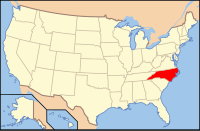Rockingham counties
| Rockingham County, North Carolina | |
|---|---|

|
|
 Location in the U.S. state of North Carolina |
|
 North Carolina's location in the U.S. |
|
| Founded | 1785 |
| Named for | Charles Watson-Wentworth, 2nd Marquess of Rockingham |
| Seat | Wentworth |
| Largest city | Eden |
| Area | |
| • Total | 573 sq mi (1,484 km2) |
| • Land | 566 sq mi (1,466 km2) |
| • Water | 7.2 sq mi (19 km2), 1.2% |
| Population | |
| • (2010) | 93,643 |
| • Density | 166/sq mi (64/km2) |
| Congressional district | 6th |
| Time zone | Eastern: UTC−5/−4 |
| Website | www |
Rockingham County is a county located in the U.S. state of North Carolina. As of the 2010 census, the population was 93,643. Its county seat is Wentworth. The county is known as "North Carolina's North Star."
Rockingham County is included in the Greensboro-High Point, NC Metropolitan Statistical Area, which is also included in the Greensboro-Winston-Salem-High Point, NC Combined Statistical Area.
Between 1728-1733, the Dan River Valley was surveyed by William Byrd II. He soon thereafter purchased 20,000 acres of the land, attracting prospective farmers. The region's first western settlers came from Pennsylvania, New Jersey, Maryland, and Virginia and were of German, English, Scottish, and Irish descent. The county was officially formed in 1785 from Guilford County. It was named for Charles Watson-Wentworth, 2nd Marquess of Rockingham, British Prime Minister from 1765 to 1766 and again in 1782. Rockingham's administration was dominated by the American issue. Rockingham wished for repeal of the Stamp Act 1765 and won a Commons vote on the repeal resolution by 275 to 167 in 1766. This made him a popular figure among British colonials in America, who would later become known as "Americans". People in North Carolina were still fond of him in the years following the independence of the United States.
...
Wikipedia
